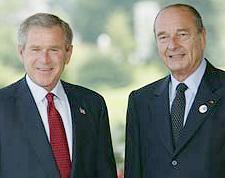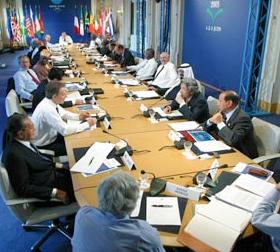|
On the health front, the leaders pledged to fund the fight against HIV/AIDS, malaria, tuberculosis, and to eradicate polio. "We welcome the increased bilateral commitments for HIV/AIDS," they stated, "whilst recognising that significant additional funds are required."
The spread of SARS demonstrates the importance of global collaboration, including global disease surveillance, laboratory, diagnostic and research efforts, and prevention, care, and treatment, the leaders stated, and promised to collaborate on this effort.
The pre-eminent threat to international security, the leaders said, is the proliferation of weapons of mass destruction (WMD) and their means of delivery, which "poses a growing danger to us all," as well as the spread of international terrorism.
North Korea's uranium enrichment and plutonium production programs and its failure to comply with its safeguards agreement under the International Atomic Energy Agency (IAEA) undermine the non-proliferation regime and are a clear breach of North Korea's international obligations, the G8 leaders stated. "We strongly urge North Korea to visibly, verifiably and irreversibly dismantle any nuclear weapons programs, a fundamental step to facilitate a comprehensive and peaceful solution."
Iran came in for a stern warning as well. "We will not ignore the proliferation implications of Iran's advanced nuclear program," they said, stressing the importance of Iran's full compliance with its obligation under the Nuclear Non-Proliferation Treaty.
"We urge Iran to sign and implement an IAEA Additional Protocol without delay or conditions. We offer our strongest support to comprehensive IAEA examination of this country's nuclear program," the G8 leaders stated.
The eight leaders reaffirmed their commitment to the Nuclear Non-Proliferation Treaty, the Chemical Weapons Convention, and the Biological and Toxin Weapons Convention, and urged all countries that have not yet joined these agreements to do so.
The leaders adopted an Action Plan on how best to use science and technology for sustainable development focused on three areas:
|



